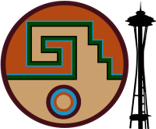Speaker
Description
The ACTS project aims to decouple the experiment-agnostic parts of the well-established ATLAS tracking software into a standalone package. As the first user, the Future Circular Collider (FCC) Design Study based its track reconstruction software on ACTS. In this presentation we describe the usecases and performance of ACTS in the dense tracking environment of the FCC proton-proton (FCC-hh) collider. An optimized tracking geometry description in ACTS is obtained by means of automated conversion from DD4hep, a generic toolkit for HEP detector description. The internal data model and extrapolation engine are the basis for the description and calculation of particle tracks. Reconstruction of the track parameters is done using the ACTS implementation of the Kalman Filter.
The high pileup rates foreseen at the FCC-hh collider are prohibitive for algorithms that scale unfavorably with the number of tracks per event. Assuming sufficient time resolution of the track detectors, it is conceivable to mitigate the performance degradation due to pileup by using precise time measurements as a fourth hit coordinate. ACTS is used to study the potential of 4D Tracking for FCC-hh.




